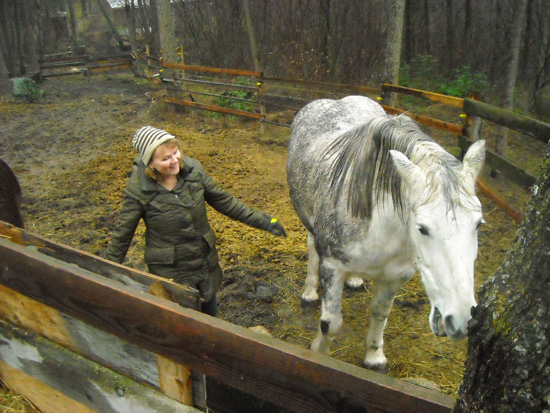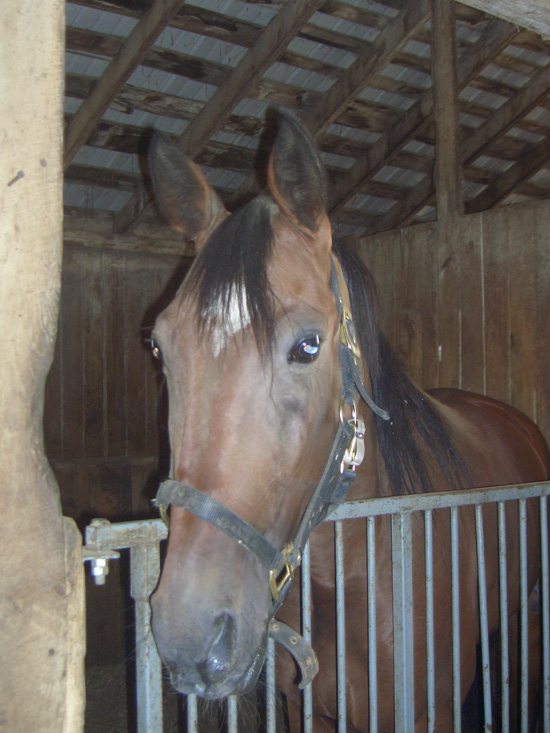The shady trade in American horsemeat
Are Europeans eating drugged up American horses?

A free daily email with the biggest news stories of the day – and the best features from TheWeek.com
You are now subscribed
Your newsletter sign-up was successful

Ken Terpenning of Lexington, Kentucky, has owned over two-dozen racehorses. But one in particular made a big impression.
"Silky Shark was everything you'd want in a racehorse," says Terpenning. "He was vibrant, fiery, a very happy horse. On the racetrack, he was a total professional. He earned over $100,000 in his career."
Like any athlete, there was an arc to Silky Shark's career. But the downward slope was faster than Terpenning could have imagined. The horse had some medical problems that led to lost races, and then Terpenning fell on tough times financially. He sold the horse to a man he trusted, but it didn't take long for Silky Shark to wind up in the "slaughter pipeline."
The Week
Escape your echo chamber. Get the facts behind the news, plus analysis from multiple perspectives.

Sign up for The Week's Free Newsletters
From our morning news briefing to a weekly Good News Newsletter, get the best of The Week delivered directly to your inbox.
From our morning news briefing to a weekly Good News Newsletter, get the best of The Week delivered directly to your inbox.
There are roughly nine million horses in the United States, and every year, people — mostly non-Americans — eat over 100,000 of them. When the U.S. banned horse slaughter five years ago, the trade didn't stop. Horse buyers merely turned their trucks north and south to slaughterhouses in Mexico and Canada. From there, most of the meat goes to the European Union.
If you're an American, odds are you disapprove of horse slaughter. But whatever your ethical perspective on eating horses, there are undeniable problems with American horsemeat: the trade route from the U.S. to the EU is riddled with fraud, shoddy record-keeping, lax enforcement and meat tainted with drugs people should never consume.
First across the finish line…
Under Terpenning's care, Silky Shark needed surgery on two occasions, and each time he was administered Phenylbutazone, or "Bute." Bute is the most commonly administered anti-inflammatory drug for horses; in fact, the drug is used so often it's also called "horse aspirin." But Bute is also a known human carcinogen. Authorities in the U.S., Canada and the European Union agree: humans should never eat a horse given Bute.
A free daily email with the biggest news stories of the day – and the best features from TheWeek.com
The only reason we know Silky Shark made it to market is because of an investigation by the Canadian Horse Defense Coalition. The organization's executive director, Sinnika Crosland, tells Latitude News the CHDC furtively gathered documents from a slaughterhouse and then identified Silky Shark by tracking his brand.
"Silky Shark went to a feedlot operator, a meat dealer," says Crosland. "He ended up shipping him up to a slaughterhouse in Quebec in July of 2011."
CHDC posted this information to their website, which is how Ken Terpenning found out.
"I was totally devastated," says Terpenning. "I cried for probably two or three days."
The Canadian Food Inspection Agency tests some meat for drug residue before it hits the market. Crosland's organization found that no horsemeat was found to have Bute in it during the month Silky Shark was slaughtered, nor were there meat recalls because of Bute in the following months.
Somebody ate Silky Shark.
The Canadian Food Inspection Agency declined to comment on the allegations raised in this story.

A horse is a horse, of course?
Sad as this might be, it's perfectly legal to flip American horses repeatedly, and then slaughter them in Canada. Each resale devalues a horse, making it easier for "kill buyers" to pick off cheap horses, then drive them across the border to a slaughterhouse.
I spoke with lots of people in the American horse industry while researching this story: vets, horse advocates, racehorse owners, slaughter experts, and politicians. Most agreed that Silky Shark's death shines a light on an industry operating in the shadows.
"Dogs, cats and horses are companion animals," says Crosland. "They have a place in the human heart. They're given drugs when they need them. People aren't holding back."
So who ate Silky Shark? It's tough to say. Some horsemeat is eaten in Quebec, but by far the biggest importer from Canada is the European Union, with Belgium, France and Italy topping the list.
When horse slaughterhouses closed five years ago in the U.S., kill buyers diverted the country's cheapest horses to Canadian and Mexican slaughterhouses.
Dan Jorgensen is a Member of the European Parliament, where he holds leading positions on two committees that oversee human health, food safety and animal welfare.
"I fear that this horse represents a larger problem," MEP Jorgensen tells Latitude News.
He's right: Silky Shark was not alone. A 2010 study tracked 18 American racehorses that were all dosed with Bute and then subsequently sent to slaughter. Silky Shark was slaughtered in Canada in 2011. And just a few months ago, inspectors in Belgium found Bute in horsemeat imported from Canada.

Obviously, these are just the documented cases. But MEP Jorgensen is getting, frankly, a little ticked off. Two years ago, he brought this exact issue up to the European Union's executive branch, the European Commission, which is responsible for enforcing standards for drug residue in horsemeat. Since his inquiry, it seems nothing has changed.
"I think it's quite concerning," says MEP Jorgensen, "that European consumers might actually be buying and eating horsemeat that we don't have any reason to believe is healthy."
In the EU every horse actually has a "passport," a physical document recording its drug history. The European Commission enforces this system, and the EC's rules for export nations like Canada and Mexico are scheduled to tighten in 2013.
In an email, a European Commission spokesperson says the details for exactly how those new rules will roll out in 2013 are not available yet. The spokesperson also insisted the EC is enforcing its standards outside of the EU through meat testing and inspections of foreign slaughterhouses.
But the Commission didn't answer Latitude News' questions about the safety of horsemeat that originates in the U.S. And — in a document leaked to Latitude News by a Canadian slaughterhouse — the European Commission said the following: "A long-term solution will have to be found regarding the import of horse meat obtained from animals born and reared in the USA and slaughtered in Canada and Mexico."
Translation: American horses are a big problem.
MEP Jorgensen wants answers from the European Commission. And he wants to see export nations like Canada, even individual slaughterhouses, heavily fined for violating drug residue rules. He also acknowledges it might be hard for Americans to swallow that the EU could crack down on a U.S. market.
"But the thing is we decide ourselves what it is we want on our market," he says, "just as you guys decide what you want on your market."
No solutions for U.S. on horizon
All this leaves the U.S. in an ambiguous position. American horses are potentially harming consumers in the EU – and elsewhere. But the U.S. has no jurisdiction over drug residue because we aren't slaughtering the horses. And it seems unlikely slaughterhouses will reopen in the U.S. anytime soon.
Temple Grandin is a professor of animal science at Colorado State University. The gear she designed — specifically to keep cattle calm during slaughter — is used in about half the slaughterhouses in North America. Grandin worries if the EU cracks down, American horses will starve and be abused.
"Obviously we can't have horses full of drug residues," says Grandin. "One of the things you can do is put them in a feed yard for six months and the drugs will come out."
The EU is technically okay with that idea because some banned drugs do dissipate from a horse's system in six months. Still, Silky Shark did sit on one of those feedlots for over six months; it doesn't matter because Bute stays in a horse's system permanently.
For Ken Terpenning, the fate of his beloved horse teaches at least one lesson: the U.S. should adopt a voluntary version of the EU's horse passport system.
"I just wish it was done," says Terpenning. "I look at his pictures on my wall every day and I just still can't believe it."
Read the full investigation on Latitude News, or hear directly form the people in this story in a Latitude News podcast.
More from Latitude News...
* Chinese-Americans find community, slam-dunks in "street" volleyball
-
 Bonfire of the Murdochs: an ‘utterly gripping’ book
Bonfire of the Murdochs: an ‘utterly gripping’ bookThe Week Recommends Gabriel Sherman examines Rupert Murdoch’s ‘war of succession’ over his media empire
-
 Gwen John: Strange Beauties – a ‘superb’ retrospective
Gwen John: Strange Beauties – a ‘superb’ retrospectiveThe Week Recommends ‘Daunting’ show at the National Museum Cardiff plunges viewers into the Welsh artist’s ‘spiritual, austere existence’
-
 Should the EU and UK join Trump’s board of peace?
Should the EU and UK join Trump’s board of peace?Today's Big Question After rushing to praise the initiative European leaders are now alarmed